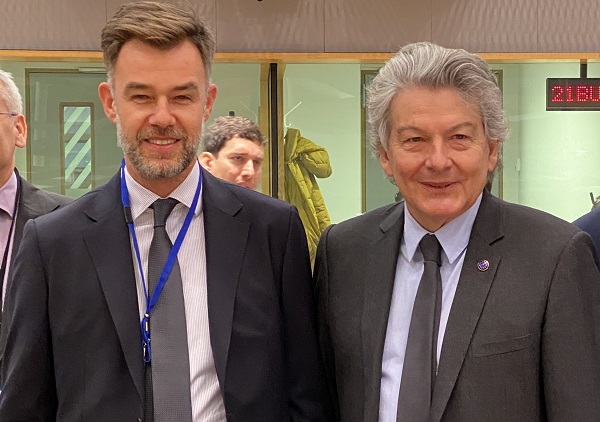 L-R: Franz Fayot, Luxembourg's Minister of the Economy; Thierry Breton, European Commissioner for Internal Market and Services;
Credit: MECO
L-R: Franz Fayot, Luxembourg's Minister of the Economy; Thierry Breton, European Commissioner for Internal Market and Services;
Credit: MECO
On Thursday 27 February 2020, the Ministers of the Economy of the European Union, including Luxembourg's Minister Franz Fayot, met in Brussels for the Competitiveness Council.
In the current context, the Council provided an update on the coronavirus epidemic and its potential impact on the European economy as well as on the coordination efforts underway to support and contain the situation.
European Commissioner for the Internal Market and Services, Thierry Breton, stressed the need to anticipate the potential impact of the coronavirus on industrial value chains, in particular those with a high dependence on imports from China, including the telecommunications, textiles, IT or even the automobile sectors. He commented: "The cooperation between the Commission and the Member States is exemplary. We talk daily about the measures to be taken".
Indeed, the reaction and prevention of health crises will be taken into account in the new industrial strategy that the European Commission will present on 10 March 2020. The Economy Ministers will take stock of the situation at the informal Competitiveness Council to be held on 19 and 20 March in Zagreb, Croatia.
The EU Economy Ministers then discussed the main priorities of the new work programme of the von der Leyen Commission, in particular the Green Deal and the creation of a European framework for artificial intelligence (AI). Adopted by the Commission last December, the Green Deal aims to redirect European funds towards sustainable investments (clean technologies, circular economy, etc.) and to encourage the decarbonisation of industry through regulatory measures, such as an EU-wide climate law or circular standards relating to goods.
During his intervention, Luxembourg's Minister of the Economy, Franz Fayot, said: “The Green Deal between Europe defines coherent and fair priorities. To succeed in the transition, we must now ensure that we establish fair competition at European and global level. The inclusion of the Paris Agreement on climate change in the trade agreements between the European Union and third countries is essential to ensure fair competition".
With regard to artificial intelligence, Thierry Breton presented the European Commission's plans to develop a European framework for ethical, responsible and human-centered AI. In the coming months, the Commission therefore intends to organise a broad debate with EU Member States, the private sector and civil society with a view to identifying needs in terms of regulations and voluntary measures such as codes of conduct. .
Franz Fayot concluded: “I support the approach proposed by the Commission. Europe must be proactive in order not to miss the digital revolution. We must trace our path that corresponds to our values and thus distinguish ourselves from China or the United States. It will also be necessary to increase investments, including public ones, in advanced technologies such as supercomputers where Europe is lagging behind its Chinese, Japanese or American competitors".









